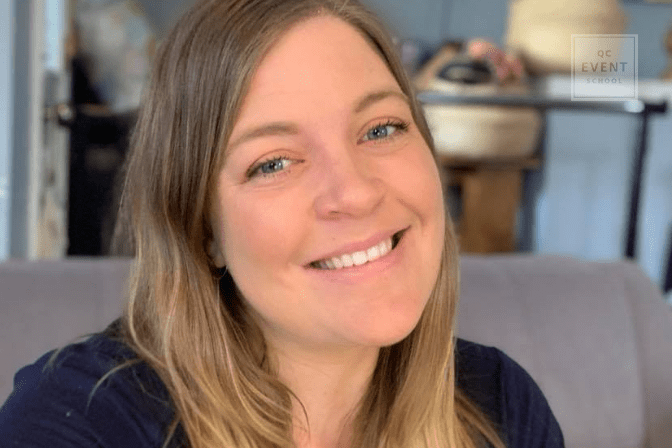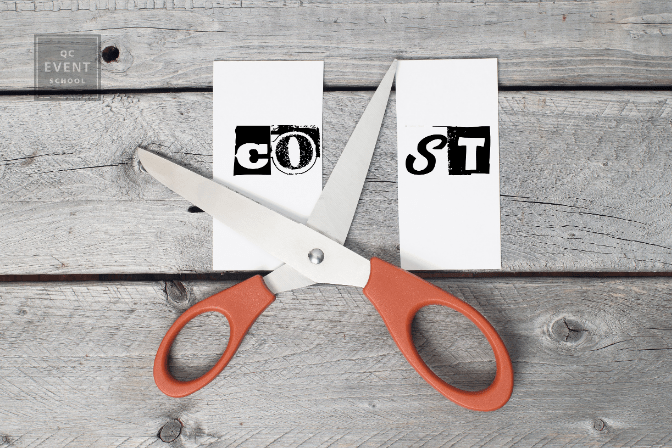
Business, General Tips, Student Ambassador, Your Event Career
Your Event Planning Career: Budgets 101
When pursuing an event planning career, one thing you’ll NEED to become a master of is working with budgets. Luckily, Nicole Thielmann is here to give you a crash course! Nicole is a QC Event School Student Ambassador and the owner of Willow North Events. Connect with her directly in the Virtual Classroom on Facebook!
The Importance of Budgets in Your Event Planning Career
Creating the budget is an important step during the planning phase of any event. Once you and your client set the goals and objectives, a budget is the logical next step. So, what is a “budget” exactly? In short, it’s the detailed estimate of what will occur financially at your client’s event. It helps control both the expenses and revenues, in order to ensure that the event is not only successful physically – but financially, too.
Developing a budget is critical to achieving the goals and objectives of the event, without having the client run out of money. Throughout your career, you’ll come to find that any clients have little to no knowledge about typical event costs. This is exactly why hiring a professional event planner is so beneficial! An industry expert will have a better understanding of event costs, will be able to find potential deals, and will help manage the clients’ expectations.
Approaching the Budget During the Client Consultation
It’s important to determine the budget during the initial consultation with your client. This will help you understand if the client has realistic goals for their event. Furthermore, it’ll help you to come up with an accurate estimate for your services.
All that being said, let’s address the elephant in the room: the topic of money can sometimes be awkward to navigate.
Ideally, you’ll want to achieve budget goals during a client consultation without making your clients uncomfortable. To achieve this, I suggest following this 3-step process when it comes to approaching the topic of money:
Step 1: Defining the Scope of the Event
To plan a successful event, it is important to first determine the focus of the event.
To best determine the scope of the event, ask your client specific questions to identify any elements that may affect the budget. Some of these questions may include:
- Who or what is the event for?
- Is the event formal?
- What are the goals of the event?
- Approximately how many guests will attend?
- How long will the event be?
- Will you need catered meals?
Step 2: Assigning Priorities
In order to determine a proper budget, it is important to assign priorities to individual aspects of the event. For example, say that your client really wants the focal point of the event to be on the sit-down dinner. As such, it’d be a smart choice to assign a higher priority to catering and beverage services.
Assigning priorities can help put the event into perspective. Doing this can also help the client allocate enough money towards these specific priorities. Sometimes, this may mean taking money away from other components of the event.
Step 3: Determining the Target Budget
Once you’ve defined the scope of the event and assigned priorities, you’ll then be able to start working on the target budget. Clients may already have a predetermined budget in mind. Alternately, they might have no idea how much their event will cost. In those cases, they’ll likely look to you to provide that information for them.
This will be your time to shine! As a professional event planner, you can use your knowledge of the industry to come up with a budget that will help them achieve their specific, unique event goals. Now, don’t be surprised if the client sometimes comes back to you and says that the budget is too high. In this case, rely on your knowledge of typical event costs to suggest a few changes that can help bring the costs down.
There are many things you can do to reduce spending. However, always make sure you keep your client’s priorities in mind!
Understanding Current Costs Throughout Your Event Planning Career
As an event planner, it’s important to have an accurate understanding of current event, vendor, and venue costs. Having this knowledge will help you to create more accurate and realistic budgets for your clients. This can help avoid the client being faced with unexpected expenses down the road. Ultimately, it will help you provide them with a better, more stress-free experience!
If you’re just getting into the industry, you may not have this knowledge just yet. That’s okay! Start by doing some market research. Reach out to local vendors and venues in your area and ask them about their rates. Networking with other industry professionals will really help you to get a better understanding of current costs!
The Average Budget Breakdown
Every event is different. However, there are some typical budget trends that you’ll notice time and time again. Below is a typical spend breakdown for an event. While many of the celebrations you organize will have different spend breakdowns, this can still be a great resource if you’re new to world of wedding and event planning!
- Entertainment and Programming: 10-15%
- Photography/Videography: 8-12%
- Stationery (I.e. Menus, invitations, place cards, programs, tickets, etc.): 2-4%
- Food: 25-33%
- Drink: 10-20%
- Venue: 10-30%
- Event Planning Fees: 10-15%
- Promotion/Marketing: 10-30%
- Contingency Planning: 5-15%
Cost Factors
There are several cost factors that will affect your client’s priorities and influence the decision-making for most – or all – event components. I will list 4 common cost factors below…
1. Number of Guests
Guest count has a major impact on an event budget! A higher guest count can affect catering, party favors, venue size, rentals, and more. It’s important to demonstrate to your client exactly how increasing the guest count will increase costs in turn.
2. Minimum Spend
Some vendors have minimum spend policies. For example, a florist might only do business with you if you spend at least $1000. It’s important to keep this in mind when selecting vendors. If the client doesn’t anticipate needing to spend $1000 on florals, it could be better to look for cheaper alternatives – or a different vendor altogether who can help keep costs down.
3. Short Notice
If your client wants to plan an event with short notice, it can often times be harder to find the best vendor rates. Since you don’t have time to wait for quotes from multiple vendors, events with short notice tend to have a higher price tag.
4. The Venue
Choosing a venue can be daunting. It is important to look at all the cost factors that each venue will bring. For example, some venues provide all-inclusive packages. These kinds of packages can provide catering, event decor, drinks, etc. Other venues will only provide the physical space to hold the event. If a venue is only providing you with space, you’ll need to factor in all of the extra expenses, such as decor and furniture rentals, linens, catering, etc.
In addition to the above, there are several other common cost factors to keep in mind. Permits, marketing and promotion, photography and videography, and taxes and gratuities are just a few examples.
Your Event Planning Career: Cutting Costs
Sometimes, it may be necessary to cut costs from the event in order to stay within the client’s budget. Here are 3 quick tips to help you cut costs:
- Suggest having the event on a more unpopular day (such as a weekday or a Sunday) when venue/vendor prices tend to be lower.
- Decrease the guest count.
- Switch from an open bar to a cash bar.
Increasing the Budget
When cutting costs simply isn’t enough, sometimes the only option is to increase the budget. This can be a delicate subject to bring up with your client. So, make sure you have exhausted all other options before approaching this subject.
If there is absolutely no way to cut costs from the budget, your client will have to find a way to increase their budget. Here are 3 suggestions for how this can be done:
- Asking family to help out.
- Hold an event fundraiser (such as a stag and doe for weddings) to raise additional funds.
- Raffles.
Food for Thought
There are many factors at play when coming up with a realistic event budget for your client. That is why it’s so important to have a strong understanding of the event industry. Although having professional training as an event planner is not required, I strongly urge anyone interested in this career to take an event planning certification course. With QC Event School, you can learn everything you need to know about event budgets – plus so much more! All of QC’s courses are completely online and self-paced.
Pro Tip: If you’d like to read more about the different reasons I recommend QC’s online certification courses, check out my blog article here!
Thanks so much for reading. I encourage you to leave a comment below with your thoughts and/or questions. Let me know if you have any tips to help with budgeting!





You are SO right! Discussing the budget off the hop is the best way to determine your client’s expectations and wedding goals!
Great read!
Thanks so much for reading and commenting, Neena. We couldn’t agree more; budgets are SUCH an important part of any event planning process. Knowing how to navigate that conversation, determine the right target budget, and then stay within it is critical. We’re glad to hear you enjoyed this article! <3
All the best,
The QC Team
This blog was great!! So much information! Way to go!
Thanks so much for taking the time to read and comment, Lauren. We agree – Nicole did a fabulous job with this article! So much interesting and useful information! <3
All the best,
The QC Team
This budget conversation was well overdue. Sometimes my clients don’t want to reveal their budget in the initial consultation and I’m so happy to take some of these steps with me.
Great read!
Very informative. Thank you for sharing with us.
Thanks so much for reading and commenting, Theodora. We’re glad to hear you found this article so informative. 🙂 Out of curiosity, which piece of information did you find the most useful in this article? <3
All the best,
The QC Team